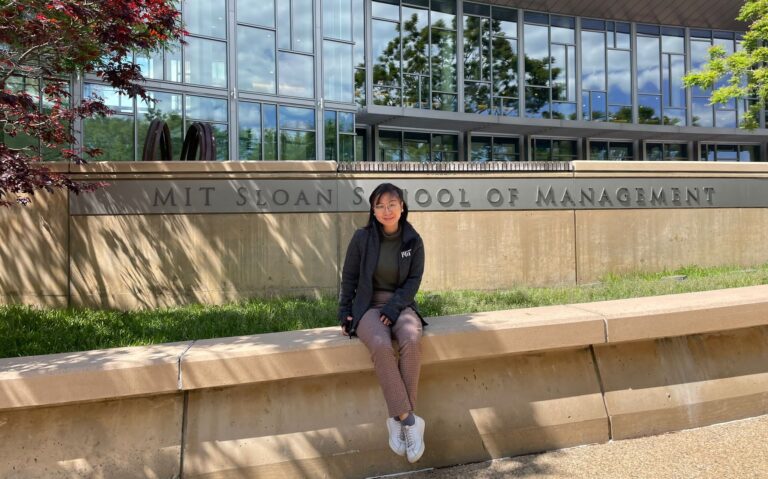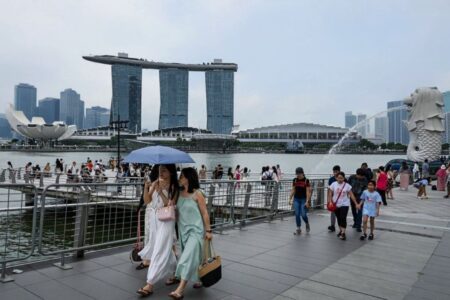
Any mention of a Master of Business Administration (MBA) degree brings up two things: the return on investment (ROI) and the price tag to achieve it. These inevitably lead to the question: “Is an MBA worth it?”
For Michelle George Tan, “worth it” doesn’t even sum up what her MBA has given her.
Born and bred in Manila, Philippines, she grew up witnessing the benefits an MBA could bring: her father built a family business out of his MBA thesis – one that’s still running today.
This became a major source of inspiration. George knew that an MBA was in her future, but she didn’t know how valuable it would be.

George pictured at the Asia School of Business campus in Kuala Lumpur, Malaysia. Source: Michelle George Tan.
The journey to earning an MBA
George’s MBA journey started not with an application to a business school, but by joining a competition.
She took part in a Malaysian bank’s “GO Ahead Challenge” which gathered 60 students from around the world in Kuala Lumpur to participate in business case challenges that even brought them to the shores of neighbouring Indonesia.
At that time, George was pursuing a bachelor’s degree in business administration at the University of the Philippines.
Thanks to the challenge, George was offered a graduate position in Maybank Philippines. Soon after, she was invited to a training opportunity in Kuala Lumpur.
“That was the first time I went out of the country for anything work-related, and I went thinking it was only going to be six months,” says George.
She ended up winning a position in the Malaysian branch, where she would trade in the financial markets for nearly four years.
“But I didn’t see myself doing that for too long; I felt like something was missing,” says George. “Maybe it was the fulfilment aspect – I wanted to do something I felt was more meaningful, and an MBA was one pathway I found that could give me the answer.”
Having been in Kuala Lumpur for so long, George knew she wanted to pursue an MBA here. It was close to home, and there were plenty of opportunities to explore that wouldn’t break the bank.
An MBA often comes with a hefty price tag – the most prestigious MBAs, like one from Harvard Business School, cost US$149,820 for the 2022-23 academic year.
George didn’t have to worry about that though – she got into the Asia School of Business (ASB) with an 80% scholarship.
The school’s one-year, full-time MBA programme features a core curriculum taught by ASB and MIT Sloan faculty, complemented by Action Learning projects with organisations across Asia and beyond.
Students also spend four weeks of immersion in MIT Sloan’s Cambridge, Massachusetts campus.
“That made it really worth it,” says George.
“You get an MIT experience and knowledge by having their professors fly in, but you don’t pay for the same thing in MIT. During the immersion weeks, we would even get classes by highly sought-after MIT professors where even MIT students can’t sign up for those classes.”

Is an MBA worth it? Depending on the quality and range of opportunities available, the answer might change. Source: Michelle George Tan.
Is an MBA worth it? That depends on the jobs you can get
Most of what makes an MBA intense are the many varied business case studies and experiential learning opportunities.
In George’s case, ASB offered Action Learning experiences that took her around the region.
Throughout her programme, she’s worked in a Malaysian financial technology start-up, an Indonesian philanthropic organisation, a Singaporean exchange, and a Malaysian venture capital.
And it’s not just experiences, knowledge, and a network of connections that George is walking away with too – she’s set for a position with her last Action Learning experience company once she’s completed her MBA.
“The programme actually helped me get something concrete out of it, partly because of what I’ve gone through,” says George.
Each of her Action Learning experiences has played a crucial role in equipping her with the skills necessary to take on her new role.
From learning to navigate the start-up scene and finance models to being exposed to sustainability funds, George can pinpoint exactly where she picked up the skills that landed her the position.
“The stars sort of aligned because of those Action Learning projects,” says George. “I was able to excel and ended up getting a job offer. So my MBA experience is really worth it.”
And that’s not counting George’s post-degree salary jump.
According to the Graduate Management Admission Council (GMAC) Corporate Recruiters Survey 2021, the average starting salary for MBA holders was between 22% and 40% higher than for bachelor’s degree holders.
North American full-time MBA students received a 50% median compensation increase from pre-MBA to post-graduation: from US$80,000 to US$120,000.
Likewise, George is expecting the same jump too, but that’s not all she’s taking away from her MBA.

Is an MBA worth it? Yes, the community you gain makes it so. Source: Michelle George Tan.
More than just professional development
At the start of her MBA journey, she was a competitive and “kiasu” person. “Kiasu” is a Hokkien Chinese word that translates to an extreme fear of losing.
“I felt like to progress in my career. I need to be the best. I need to be right,” says George.
Unlike other bachelor’s or master’s programmes, MBAs are primarily designed to emphasise group work and team effort.
As a programme catered towards those seeking to advance their careers in business and management, especially those hoping for leadership roles in various settings, the ability to lead and be part of a team is key throughout all MBA curricula.
“I remember that in my first year, I had a mindset of, ‘Oh my god, my teammates are slower than I wanted,” says George. “I pulled out my ‘kiasuness’, pushed everyone, and we achieved good results. But I felt distanced from my team; it did not feel right.”
“It is what made me realise that relationships are more important than being right and being fast. That’s actually the best thing I learned.”

Something that many don’t consider when asking, “Is an MBA worth it?” — the friends you make along the way. Source: Michelle George Tan.
It’s a bond that extends outside of formal learning environments too.
As much as many view the relationships formed during an MBA as transactional, those who’ve experienced it find genuine, lasting friendships.
For George, being able to stay in ASB’s on-campus accommodation means having more opportunities to be with the friends she’s made during the programme.
Located in the heart of Kuala Lumpur and within the national bank’s learning hub, ASB’s 65,000-square-metre facility makes it one of the largest academic facilities in the world.
Like George, students have the option to stay in a multi-block facility that houses up to 350 visiting and full-time students for easy access to the campus and the community.
“Staying here is part of the experience because you have all these water cooler conversations,” says George. From there, it’s turned into hangouts over the weekends and trips to India and Indonesia, all hosted by the friends in the programme.

George (third from the left), pictured with group mates during her Action Learning project in Malaysia. Source: Michelle George Tan.
A path of personal growth
George’s MBA journey may be coming to a close, but the lessons she’s gained are more than she’d expected when she first joined the programme.
Before the MBA, George didn’t know what she was looking for.
“When I was younger, it was just about finding a glamorous job,” she says.
“But being here and seeing my classmates who are into social impact and having done those Action Learning projects made me realise that I want to do something that gives me the same meaning and fulfilment from those experiences.”
Outside of all the perks for her career, George reflects that she’s grown and transformed as a person too.
“I feel more mature than when I started my MBA and I connect better with people now,” says George. “I have the confidence that I can survive anywhere you put me.”
“I know having a positive career outlook is important, but I feel like the more important thing is developing yourself first as a person because wherever you end up putting yourself, you will survive because you have that confidence. That, to me, is important.”
So, is an MBA worth it?
Looking at every aspect of her professional and personal journey, George’s answer is “yes.”










